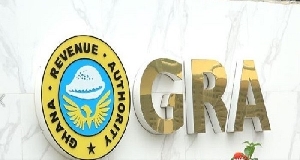The Ghana Revenue Authority has begun a series of sensitisation programmes for individuals and institutions on the need for them to file their annual income tax returns not later than the end of April.
The Ghana Revenue Authority sets aside April every year as Tax and Good Governance Month to sensitize and encourage taxpayers as well as educate them on how to file their income tax returns and also pay the applicable taxes.
During the month, the GRA organises seminars, workshops and tax clinics to make sure that we get to the taxpayers and then tell them what their responsibilities are and what benefits they are in when they file their returns.
Speaking at a programme for public sector workers, Dr Martin Kolbil Yamborigya, Assistant Commissioner and Head of Audit for the Large Taxpayer Office, said aside from the objective of creating awareness, the sensitisation was also to remind taxpayers of their obligation in filing their tax returns.
“We also educate them to understand that filing their tax return is not just for you to pay tax, but it also affords you or gives you the opportunity to claim certain benefits,” he said.
He said some of the reliefs taxpayers could enjoy, include child education relief, marital relief, and mortgage relief.
“When you file your returns, you have access to that When you file your returns, you also have the opportunity to even claim an overpayment, assuming that as a result of this relief that you are enjoying, the taxes that you paid during the year is more than what you should have paid,” Dr Yamborigya said.
“You will be in an overpayment position and then the law requires that when you have overpaid your tax, then the Commissioner General is supposed to refund that to you within 60 days after the overpayment has been established.”
He said filing of returns was an obligation and sanctions such as monetary penalties and terms of imprisonment were applied to taxpayers who fail to comply with the law.
However, to encourage people to voluntarily comply, section 74 of the Revenue Administration Act was amended to allow taxpayers on their own volition disclose accurate information to the Commissioner- General to have their penalties, either monetary or imprisonment, waived.
“So we want to encourage people and this is something that is not just like a one-off amnesty. It is something that was incorporated into the law that at any time a taxpayer can always take advantage of that,” he said.
Dr Martin also urged people who earn income from outside the country to voluntarily disclose it and pay
the appropriate taxes in Ghana to have whatever penalties that would have been imposed waived.
Meanwhile, Dominic Adamnor Nortey, Chief Revenue Officer, said the tax on resident Ghanaians who earned income outside the country was not a new one.
He explained that the law had been in place since 2016 and required anyone who is in Ghana but earns income outside the country to consolidate all incomes, whether earned in Ghana or outside and then subject that to tax.
He said the law is now been implemented because the GRA now had enough information to kickstart implementation.
“We don’t start anything when you don’t have the basis of getting information on people’s income outside. So, now that we have signed an agreement with about 170 countries where we exchange information, now we have information enough to believe that we can drive that aspect of the law and implement it successfully,” Mr Nartey said.
“The Act is clear that anyone who earns income, whether small, big or whatever it is, you have to pay tax on it,” he said, adding that he had nothing to do with VAT at all.
Business News of Wednesday, 17 April 2024
Source: www.ghanaweb.com













